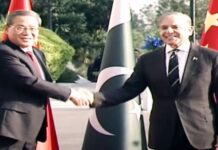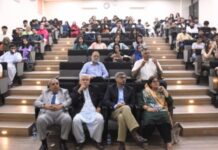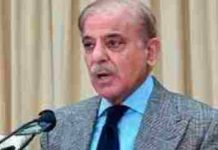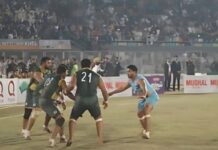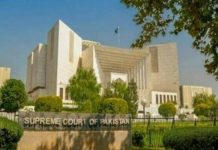ISLAMABAD, Oct 03 (NNI): The Supreme Court of Pakistan on Thursday overturned its 2022 verdict related to the defection clause under Article 63-A of the Constitution by accepted a review petition against it.
A five-member bench, headed by Chief Justice of Pakistan (CJP) Qazi Faez Isa and comprising Justices Naeem Akhtar Afghan, Aminuddin Khan, Jamal Khan Mandokhail, and Mazhar Alam Khan Miankhel, heard the review petition filed by the Supreme Court Bar Association (SCBA) in June 2022.
As all the sides concluded their arguments, the judges held consultations inside the courtroom and later CJP Isa pronounced the unanimous brief verdict striking down the 2022 ruling regarding Article 63-A interpretation.
Effectively withdrawing its opinion on the presidential reference regarding Article 63-A, Justice Isa said detailed decision will be released later.
Through its May 17, 2022 verdict, the Supreme Court had declared that the vote cast contrary to the parliamentary party lines under Article 63-A should not be counted.
Article 63-A aims to restrict the voting powers of lawmakers by making them bound to the decision of the “party head” — whoever is formally declared the head of the party. The penalty for violating Article 63-A is disqualification from the National Assembly and the vacation of the defecting lawmaker’s seat, the Constitution states.
Ali Zafar, counsel for former prime minister and Pakistan Tehreek-e-Insaf (PTI) founder Imran Khan, on Thursday boycotted the hearing of the review petition filed in the case of an interpretation of Article 63-A of the constitution by the Supreme Court.
A five-member larger bench of the SC, headed by Chief Justice of Pakistan (CJP) Justice Qazi Faez Isa, heard the petition filed by the Supreme Court Bar Association.
During the hearing, Ali Zafar, while addressing the CJP, said that the original decision given by the apex court in the case was a bulwark against horse-trading.
PTI’s lawyer informed the court that Imran Khan had asked him to boycott the hearing since the constitution of the bench was not on merit. “If you don’t allow the PTI founder to give his viewpoint on the case, we will boycott the case’s hearing.”
He said that the case under review was linked to the proposed constitutional amendments. “Besides other things, drafters of these amendments want to increase the CJP’s term in office,” Zafar added.
The chief justice remarked he knew nothing about these amendments. “And we are not interested in discussing them either.”
PTI’s lawyer said that the government planned to introduce these amendments as well as the judicial package for the chief justice. “And if you give the decision in the government’s favour, it will lead to horse-trading,” he said.
“You are crossing the limits. The court can issue you a contempt of court notice,” Justice Isa shouted. “This is such a scandalous remark. We will not allow you to say that.”
Justice Jamal Mandokhel asked Zafar how he reached the conclusion that the court’s decision would pave the way for horse-trading.
The CJP remarked that he was making political statements to make headlines in newspapers.
Justice Mandokhel said that what was being referred to as an original decision was in fact an opinion by the court on the article presently under discussion. “Even today, there is a headline that constitutional amendments are a must before October 25,” Zafar said.
The chief justice said it was not in his knowledge. “Please stop ridiculing the courts. Irked over the repeated mention of Imran’s name during the hearing, Justice Isa asked his counsel to avoid mentioning his name and move forward.
The CJP said he could better describe to him what horse-trading was. “You will feel embarrassed when we do that.”
Zafar said that the constitution gave citizens the right to form political parties. “But nowhere is there any mention in the document that parties can also contest the general elections.”
These were the courts, he added, which through the interpretation of the constitution gave the parties the right to contest the elections. “This interpretation does not amount to rewriting the constitution,” he argued.
Justice Mandokhel remarked that if the SC had given its opinion, and not its decision, on the presidential reference, then why it was being implemented.
Addressing PTI’s lawyer, the chief justice asked him why he felt nervous. “You give your arguments. We can also reject the review petition.”
Zafar said that a review petition could not be filed when the court had merely given its opinion. “If the petitioner wanted a further clarification, he could have gone and asked the president,” PTI’s lawyer said.
Addressing Zafar, the CJP said the PTI, too, had filed a plea in the same case. “We had demanded lifetime disqualification of a lawmaker for floor crossing,” the former replied.
The chief justice reiterated that a judge was nobody to say that an MP had defected to another party. “It is the party head who can give such a certificate,” he said, and added, “Parliamentarians as well as political parties are not subordinate to any judge or a chief justice. They are answerable to the party head.”
Justice Mandokhel opined that it was a parliamentarian’s, and not a party’s, right to vote.
PTI’s lawyer said it was a parliamentary party that gave instructions to an MP to vote for or against a bill. “And if the MP does not abide by his instructions, the party head can send a reference, seeking his ineligibility,” he elaborated.
The CJP said that meant voting against the party’s instructions was akin to a ‘suicide.’ “Not only legislator’s vote is not counted, he also loses his seat in the Assembly.”
He remarked that if an MP did not agree with his party’s policy, he or she could resign from the seat.
Citing an apex court verdict, Zafar said it had ruled that the misuse of the right to vote would not be allowed.
Disagreeing with his argument, the chief justice said what he was saying went completely against democracy. “Let democracy flourish in the country,” he said while addressing the PTI’s lawyer.
Justice Naeem Akhtar Awan was of the view that the time at which the reference had been filed told the complete story. “PTI remained in power for over three years. However, it did not amend Article 63-A. But the moment, a no-trust motion was moved, it got afraid that some of its MPs might vote against it,” he said, adding, “Voting on the motion was to be held on April 3 while the reference landed in the apex court on March 21.”
The judge went on to say that at that time the PTI looked up to the SC, and not the parliament, to bail it out. “Is not it clear now that the party used the reference to protect itself from the no-confidence motion?”
Justice Afghan said the truth of the matter was that the SC needed to do its own job and the parliament its own.
Justice Mazhar Alam Miankhel remarked that Justice Afghan had solved the entire case.
The chief justice dispelled the impression there was any bad blood between the SC judges. “It is not that the apex court has fallen apart,” he added.
He advised political parties to settle their differences. NNI








